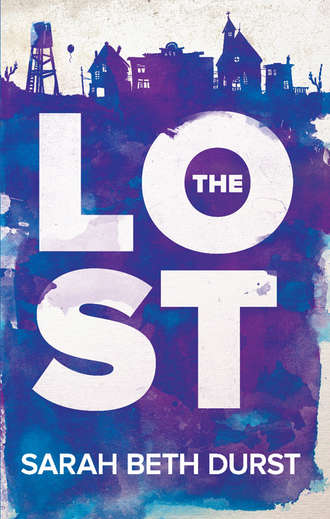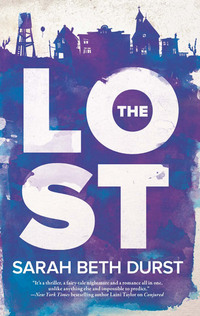
Полная версия
The Lost
He stretches his arms out expansively. “I want you to choose your dream home.” He looks, for a moment, like he can grant wishes. He’s smiling, but his eyes are serious, as if they hold a thousand secrets. He has magical eyes.
I shake my head. “I want someplace that’s safe. A house that the townspeople won’t notice I’m in. And that won’t crash on my head if the wind blows. The rest doesn’t matter. I’m not planning to stay, remember?” I look at Claire, away from Peter and his captivating eyes. “You want to choose for me?”
She points at a little yellow house. It’s nestled in between an oversize sprawling Colonial and a rusted mobile home. Its shingles are half–fallen off so that it looks like a mouthful of baby teeth, half-gone and waiting for grown-up teeth. The weeds are so high that they obscure the porch, and the front door gapes open.
I like it.
I don’t admit that. “All right,” I say.
“I always wanted my own room,” Claire says. “I had three sisters and two brothers, and we shared. My sister Bridget always stole the covers. And Margaret snored. I used to make my own pretend room in the back of the garage underneath Daddy’s workbench. I’d move boxes around to make a nest and fill it with towels to make it comfy. I’d store snacks in case I was hungry. It was nice there.”
I want to ask if she misses them, if she knows what happened to her brothers and sisters, if she ever wants to go back. I want to know if it was an accident that she was left, and if so, how could anyone not return for her. I wonder if her parents are alive or not and if they regret what they did. “Where do you live now?”
She shrugs. “Nowhere. Everywhere.”
A homeless six-year-old. My heart lurches. “You can have a room in this house, if you want.”
Her face lights up as if the sun poured over it.
“It’s just temporary, remember,” I caution her. I don’t want her thinking that I’m inviting her into my life long-term. I’m not her new mommy. I am a very long way from being anyone’s mommy. I’d have to be a lot less selfish and a lot less cowardly first. “But you can stay as long as I stay.” With luck, that won’t be more than a few days. I try not to think about how statistically unlucky I am. In a few days, I could be squashed by a chunk of falling satellite. Or mauled in a shark attack.
Her face falls. “You feel sorry for me.”
“And for myself.” I am not going to lie to her. I always hated when adults did that to kids—all the classic lies, like you can be anything you want to be and work hard enough and good things will come to you, and all the little lies, like you’re smart, you’re beautiful, you’re special.
She considers that. “Okay.”
Peter has run ahead. He’s scrambling over the junk in the yard and then over the roof. He climbs to the peak and scans the view. I am surprised more of the stray kids aren’t here, but there’s no hint of movement around any of the nearby houses. The kids must still be in town, or playing on other heaps of rust and broken glass elsewhere. I wonder how long we have until they return, if they’ll return. Perhaps the place has already been picked over. I wonder if they’ve left anything we can eat or use.
He swings down from the porch roof and lands on the railing. It creaks beneath his weight, but it doesn’t collapse. Claire and I wade through the weeds in the front yard as he disappears into the house.
“I wanted to see it first,” she pouts.
“Let him scare away the rats, snakes, and whatever other wildlife is in there.”
“You didn’t need him to scare away the dogs.” She mimics my charge at the dogs. Her mouth is open in a mock scream.
“I don’t like dogs,” I say.
“Why not?”
“It’s the drool. And the teeth. And when I was in kindergarten, one of the kids brought in their pet dog for show-and-tell. It peed all over the R in the alphabet carpet. I used to always sit on the R.”
“I don’t like them because they bite,” she says.
“Your reason is better.”
We reach the porch. Some of the slats in the floor are broken, but overall it seems solid enough. Stacks of old moldy letters, catalogs, and magazines lean against the wall of the house, and cobwebs encase two rocking chairs. I can clean them easily, ditch the old mail, sweep the floor, make it livable.
The front door swings in the breeze, slapping against the wall. It looks to have a lock and dead bolt, though they won’t do much good since the window in the door is missing. Also, there are other broken windows around the house. We could board them up, I think. Prevent unwanted visitors.
Claire skips inside as if this place is already home. I wonder what on earth I’m thinking, playing house with a little girl, thinking of home improvements as if I mean to stay for longer than a day. But it might be longer, and the motel won’t take me, the car is uncomfortable, and there are houses to spare. Besides, Claire is happy. I tell myself that it’s okay to be practical, that I’m not running away by staying, that I do want to go home as soon as I can, that Mom is most likely perfectly fine and her stomachaches aren’t part of a relapse, or worse. I don’t need to hide from the truth.
I follow Claire inside. The entryway has peeling wallpaper with roses so tiny and dirty that they look like bugs. A grimy mirror hangs on one wall. Coat hooks are beside it, and one raincoat hangs on a hook. To the left off the hallway is the kitchen. Claire has disappeared into another room, but in the kitchen, Peter is investigating its cabinets. “Pasta!” He picks up a box of spaghetti and shakes it. Moths fly out the top of the box. He puts it back. “Never mind.”
“Is there electricity?” I ask, crossing to the refrigerator. I open it, and a blast of sour milk and the reek of rotted vegetables washes over me, but so does cool air. I shut it. “Running water?”
He tests the sink. It gurgles at first, and then a gush of rust-colored water sprays out. The pipes haven’t been used for a while, but I bet it will run clear soon.
“How’s this possible?” I ask. “I don’t remember any power lines. All the houses look just plopped in the desert. And besides, no one is here to pay the bills.”
“People lose power all the time,” Peter says. “And water is wasted every day.”
“Huh,” I say. “Convenient.”
Peter smiles a knowing smile.
I study him for a moment, the Finder, Little Red Riding Hood’s wolf, Sisyphus, whoever he is. “You led us to this house on purpose. You knew it had this.” I wave my hands at the sink with running water and the functional fridge.
He bows, sweeping his trench coat behind him. It’s an elegant, archaic, and practiced bow. “I am your guardian angel, your fairy godfather, and your knight in shining armor.”
“Kind of,” I say. And he kind of is. He’s my angel in a trench coat, first saving me from the dust storm and now this. It helps that he’s drop-dead gorgeous, exactly the type I would have picked out of a crowd from the wild-boy smile to the artist-quality tattoos—exactly the type I swore never to date again. Luckily, I’m not looking to date anyone.
He holds out his hand. “Come see the rest of the house. You’ll like it.”
I take his hand and let him guide me into the living room. A picture window (sadly broken, a quarter of the glass gone) with a window seat opens onto a view of the desert. Two once-white couches lie under a sheet of dust. Books and cobwebs fill the shelves. The fireplace is full of ash. It’s as if the old occupants simply left. It’s extraordinary that the place hasn’t been found by any scavengers or occupied by wildlife, especially with the broken windows.
Конец ознакомительного фрагмента.
Текст предоставлен ООО «ЛитРес».
Прочитайте эту книгу целиком, купив полную легальную версию на ЛитРес.
Безопасно оплатить книгу можно банковской картой Visa, MasterCard, Maestro, со счета мобильного телефона, с платежного терминала, в салоне МТС или Связной, через PayPal, WebMoney, Яндекс.Деньги, QIWI Кошелек, бонусными картами или другим удобным Вам способом.



